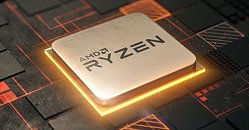- Joined
- Oct 9, 2007
- Messages
- 47,478 (7.49/day)
- Location
- Hyderabad, India
| System Name | RBMK-1000 |
|---|---|
| Processor | AMD Ryzen 7 5700G |
| Motherboard | ASUS ROG Strix B450-E Gaming |
| Cooling | DeepCool Gammax L240 V2 |
| Memory | 2x 8GB G.Skill Sniper X |
| Video Card(s) | Palit GeForce RTX 2080 SUPER GameRock |
| Storage | Western Digital Black NVMe 512GB |
| Display(s) | BenQ 1440p 60 Hz 27-inch |
| Case | Corsair Carbide 100R |
| Audio Device(s) | ASUS SupremeFX S1220A |
| Power Supply | Cooler Master MWE Gold 650W |
| Mouse | ASUS ROG Strix Impact |
| Keyboard | Gamdias Hermes E2 |
| Software | Windows 11 Pro |
AMD in its Q2-2018 investors conference call dropped more hints at when it plans to launch its 3rd generation Ryzen processors, based on its "Zen2" architecture. CEO Lisa Su stated in the Q&A session that rollout of 7 nm Ryzen processors will only follow that of 7 nm EPYC (unlike 1st generation Ryzen preceding 1st generation EPYC). What this effectively means is that the fabled 16-core die with 8 cores per CCX won't make it to the desktop platform any time soon (at least not in the next three quarters, certainly not within 2018).
AMD CEO touched upon the development of the company's 7 nm "Rome" silicon, which will be at the heart of the company's 2nd generation EPYC processor family. 2nd generation EPYC, as you'd recall from our older article, is based on 7 nm "Zen2" architecture, and not 12 nm "Zen+." 3rd generation Ryzen is expected to be based on "Zen2." As of now, the company is said to have completed tape-out of "Rome," and is sending samples out to its industry partners for further testing and validation. The first EPYC products based on this will begin rolling out in 2019. The 7 nm process is also being used for a new "Vega" based GPU, which has taped out, and will see its first enterprise-segment product launch within 2018.

With "Zen 2" based client-segment product being slated for 2019, there doesn't appear to be any immediate counter from AMD to Intel's 14 nm 8-core "Whiskey Lake" silicon; beyond maybe launching existing 12 nm "Pinnacle Ridge" based products with higher clocks, or lowering prices. The company will be launching its 2nd generation Ryzen Threadripper processors within 2018, but those are HEDT products not designed to compete with "Whiskey Lake." Any interim new 12 nm "Zen+" silicon with >8 cores would go against what Dr. Su stated in her Q&A, and is hence unlikely. "Rome" was the only CPU development mentioned by Dr. Su.
View at TechPowerUp Main Site
AMD CEO touched upon the development of the company's 7 nm "Rome" silicon, which will be at the heart of the company's 2nd generation EPYC processor family. 2nd generation EPYC, as you'd recall from our older article, is based on 7 nm "Zen2" architecture, and not 12 nm "Zen+." 3rd generation Ryzen is expected to be based on "Zen2." As of now, the company is said to have completed tape-out of "Rome," and is sending samples out to its industry partners for further testing and validation. The first EPYC products based on this will begin rolling out in 2019. The 7 nm process is also being used for a new "Vega" based GPU, which has taped out, and will see its first enterprise-segment product launch within 2018.

With "Zen 2" based client-segment product being slated for 2019, there doesn't appear to be any immediate counter from AMD to Intel's 14 nm 8-core "Whiskey Lake" silicon; beyond maybe launching existing 12 nm "Pinnacle Ridge" based products with higher clocks, or lowering prices. The company will be launching its 2nd generation Ryzen Threadripper processors within 2018, but those are HEDT products not designed to compete with "Whiskey Lake." Any interim new 12 nm "Zen+" silicon with >8 cores would go against what Dr. Su stated in her Q&A, and is hence unlikely. "Rome" was the only CPU development mentioned by Dr. Su.
View at TechPowerUp Main Site





